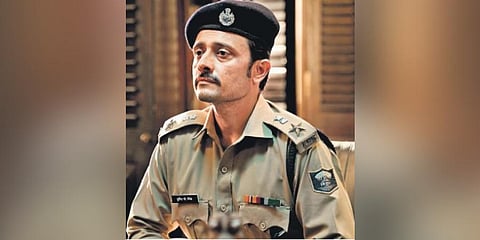

Love is finding space again in Hindi cinema. Filmmakers are tired of anger and are realising that change won’t happen through Twitter arguments. The most radical of them all, Anurag Kashyap, now wears a hoodie which reads “Mohabbat se hi toh kranti aayegi (Only love can lead to revolution)”. Rahul Gandhi is traversing the length of the country for love.
Maybe that’s why a series based on the 2005 jailbreak in Bihar’s Jehanabad, where CPI (Maoist) rebels attacked a police station in the dead of the night to free their comrades, chose love to tell the tale of rebellion.
SonyLiv’s show Jehanabad: Of Love and War has two plotlines running parallelly. A police officer, SP Durgesh Pratap Singh (Satyadeep Mishra) is tasked with containing a Naxalite leader Deepak Kumar (Parambrata Chattopadhyay). On the other hand, love is blooming between erudite college professor Abhimanyu Singh (Ritwik Bhowmick) and a young buoyant student Kasturi Mishra (Harshita Gaur). Politician Shivanand Singh(Rajat Kapoor) is the one pulling the strings in both tales. The showrunner is Sudhir Mishra (Hazaaron Khwaishein Aisi).
“I think people should fall in love often, I know I have,” says Rajeev Barnwal, the show’s creator and director, with an easy laugh. We, along with actors Rajat Kapoor and Satyadeep Mishra, were sitting in a corner room at a Mumbai hotel. “I met a girl in 2005 whose story became Kasturi’s in the show. In November of that year, I read about the jailbreak. I got curious. One city sleeps after having dinner, gets attacked and people rescue their leader from jail. I thought why did this happen? What made them go on this path (Maoism)? So, I took this love story and this event and fictionalised them both. What I wanted to say was that love can be a solution to all conflicts.”
When asked if they have ever rebelled for love, Rajat says, “I can’t say about rebellion but I remember how intense love was when we were young. Oh, the heartbreaks…”
Rajeev pauses, and frames his anecdote, “I fell in love with a girl my parents didn’t approve of. I was 23, she was 30. Once she called my house to wish me on my birthday and my mother picked up the call and said…”
“Chudail (Witch),” interjects Rajat. Rajeev lets out a chuckle, and continues, “…But I said if I do marry, it will be with her. I was sort of a rebel in my small town in Jharkhand. I was in love with an older woman and I wanted to be a filmmaker.”
The series also explores caste discrimination at a college campus. A Dalit student is killed because he touched a Savarna during a game of Kabaddi.
“I have to confess, I had a sheltered existence till I moved to Delhi for college, says Satyadeep. He continues, “Only there, I realised which surname means what.” He further expressed the need for active politics in colleges. “I think the student’s voice is the most unadulterated. Their opinions might be considered naïve by some, but they are noble and border on truth.”